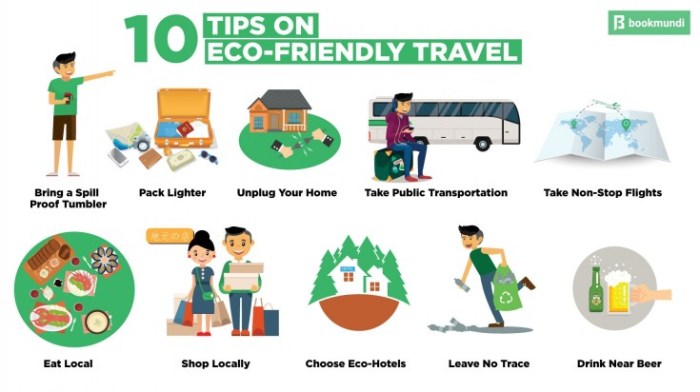Embark on an eco-conscious journey with our comprehensive guide to eco-friendly travel tips. Discover innovative ways to minimize your environmental impact while exploring the world, embracing sustainable practices that protect our planet for future generations.
From choosing eco-friendly transportation options to supporting local businesses and reducing waste, this guide empowers you to travel responsibly, leaving a positive legacy on the destinations you visit.
Sustainable Transportation Options

Embracing sustainable transportation options is crucial for reducing our carbon footprint and promoting eco-friendly travel. Public transportation, cycling, and walking are excellent choices that minimize emissions and foster a healthier environment.
Beyond traditional methods, innovative transportation modes like electric vehicles (EVs) and hydrogen-powered cars offer promising alternatives. EVs run on electricity, eliminating tailpipe emissions and reducing air pollution. Hydrogen-powered cars utilize hydrogen fuel cells to generate electricity, producing only water vapor as a byproduct.
Public Transportation
Public transportation systems, such as buses, trains, and subways, offer a convenient and eco-conscious way to travel. By consolidating passengers into larger vehicles, public transportation significantly reduces the number of individual vehicles on the road, thereby reducing traffic congestion and emissions.
- Lower carbon footprint: Public transportation emits fewer greenhouse gases per passenger mile compared to driving.
- Reduced traffic congestion: By encouraging people to leave their cars at home, public transportation helps alleviate traffic jams and improve air quality.
- Enhanced accessibility: Public transportation provides mobility options for those without access to personal vehicles, promoting inclusivity and equitable access to transportation.
Cycling and Walking
Cycling and walking are not only healthy and enjoyable activities but also environmentally friendly modes of transportation. These human-powered options eliminate emissions entirely and promote physical activity.
- Zero emissions: Cycling and walking do not produce any tailpipe emissions, contributing to cleaner air and reducing our carbon footprint.
- Improved health: Regular cycling and walking promote physical fitness, reduce the risk of chronic diseases, and improve overall well-being.
- Space efficiency: Compared to cars, bicycles and pedestrians require significantly less space on the road, allowing for more efficient use of urban areas.
Electric Vehicles (EVs)
Electric vehicles (EVs) are powered by electricity stored in rechargeable batteries, eliminating tailpipe emissions and significantly reducing air pollution. EVs offer a practical and sustainable alternative to conventional gasoline-powered vehicles.
- Zero tailpipe emissions: EVs produce no greenhouse gases during operation, contributing to cleaner air and mitigating climate change.
- Reduced operating costs: Electricity is generally cheaper than gasoline, resulting in lower fuel costs for EV owners.
- Improved energy efficiency: EVs are more energy-efficient than gasoline-powered vehicles, consuming less energy per mile traveled.
Hydrogen-Powered Cars
Hydrogen-powered cars utilize hydrogen fuel cells to generate electricity, producing only water vapor as a byproduct. This technology offers a promising alternative to EVs, especially for long-distance travel or heavy-duty vehicles.
- Zero tailpipe emissions: Hydrogen-powered cars emit only water vapor, making them environmentally friendly and contributing to cleaner air.
- Extended range: Hydrogen fuel cells provide a longer range compared to EVs, making them suitable for long-distance travel.
- Rapid refueling: Hydrogen refueling stations can quickly replenish hydrogen fuel, reducing wait times and improving convenience.
Accommodation Choices: Eco-friendly Travel Tips
Selecting eco-friendly accommodations is crucial for sustainable travel. Opt for hotels and guesthouses that prioritize energy efficiency, water conservation, and waste reduction. Certifications like LEED (Leadership in Energy and Environmental Design) and Green Key can help identify such establishments.
Supporting Local Businesses
Supporting locally-owned businesses and community-based tourism initiatives benefits the local economy and promotes cultural preservation. These businesses often have a deeper understanding of the area and can provide authentic experiences while contributing to the community’s well-being.
Responsible Food Consumption
Adopting responsible food consumption habits while traveling is crucial for reducing our environmental impact and supporting local communities. One key aspect is choosing local and seasonal produce, as it significantly reduces carbon emissions associated with transportation and refrigeration.
Minimizing Food Waste
Reducing food waste is essential to prevent the unnecessary depletion of resources. Consider these tips:
- Plan meals in advance to avoid over-purchasing and potential spoilage.
- Store food properly to extend its shelf life.
- Utilize leftovers creatively to avoid waste.
- Compost organic waste, such as fruit and vegetable peels, to nourish the soil.
Supporting Sustainable Farming Practices
Supporting sustainable farming practices ensures the long-term viability of local food systems and minimizes environmental degradation. Here are some ways to contribute:
- Visit farmers’ markets to purchase directly from local farmers.
- Choose organic and sustainably grown produce to reduce chemical pollution.
- Support farms that implement conservation practices, such as crop rotation and cover cropping.
Eco-Conscious Activities

Eco-conscious activities prioritize minimizing environmental impact while maximizing enjoyment. Consider these sustainable options to preserve the beauty of your destinations:
Opt for wildlife viewing experiences that respect animal welfare, ensuring minimal disruption to their natural habitats. Participate in guided tours led by experts who prioritize conservation efforts.
To reduce your environmental impact while exploring, consider eco-friendly travel tips like choosing sustainable transportation and opting for accommodations with green initiatives. Immerse yourself in the cultural heritage of humanity by visiting UNESCO World Heritage Sites. These sites showcase remarkable natural and cultural landmarks, offering an opportunity to connect with history while embracing sustainable tourism practices.
Hiking and Nature Trails
- Explore national parks and designated hiking trails that implement responsible trail management practices.
- Stay on designated paths to prevent erosion and damage to fragile ecosystems.
- Pack out all waste, including food scraps and packaging, to maintain the pristine beauty of natural areas.
Supporting Local Tour Operators
Choose tour operators committed to responsible tourism principles. These operators often:
- Prioritize conservation and environmental protection in their practices.
- Employ local guides, supporting the community’s economic development.
- Educate tourists about the importance of responsible travel and cultural sensitivity.
Waste Reduction and Recycling
Minimizing waste generation and promoting responsible recycling practices are crucial for eco-friendly travel. Implementing simple measures can significantly reduce our environmental impact while exploring new destinations.
To effectively reduce waste, consider packing reusable items such as water bottles, coffee cups, and shopping bags. Opting for refillable containers and avoiding single-use plastics like straws and plastic utensils is also essential. Additionally, utilizing recycling facilities available at hotels, airports, and public spaces helps ensure proper waste disposal and reduces the burden on landfills.
Proper Waste Disposal
Proper waste disposal is paramount to safeguard ecosystems and prevent pollution. When traveling, make an effort to segregate waste into designated bins for recyclables, compostables, and general waste. This allows for efficient processing and reduces the amount of waste ending up in landfills or harming wildlife.
While embracing eco-friendly travel tips can enhance your adventures, the US boasts a wealth of breathtaking hiking trails that beckon outdoor enthusiasts. Discover the best hiking trails in the US , where you can immerse yourself in nature’s splendor while adhering to sustainable practices.
Remember, eco-friendly travel empowers you to explore responsibly, preserving these pristine trails for future generations.
Water Conservation
Water is a precious resource that is often taken for granted. When traveling, it is important to be mindful of our water consumption and take steps to conserve this vital resource.
There are many simple ways to conserve water while traveling. Here are a few tips:
Take Shorter Showers
- Shorter showers can save a significant amount of water. Try to limit your showers to 5-10 minutes.
- Use a low-flow showerhead. This can reduce the amount of water used by up to 50%.
Reuse Towels
- Instead of washing your towels every day, hang them up to dry and reuse them for multiple days.
- This can save a significant amount of water and energy.
Choose Water-Efficient Appliances
- When choosing appliances for your hotel room or vacation rental, opt for water-efficient models.
- Look for appliances with the WaterSense label. This label indicates that the appliance meets certain water-efficiency standards.
By following these simple tips, you can help conserve water while traveling and reduce your environmental impact.
The Environmental Consequences of Water Scarcity
Water scarcity is a serious problem that affects many parts of the world. When water is scarce, it can have a devastating impact on human health, the environment, and the economy.
Water scarcity can lead to:
- Drought
- Famine
- Disease
- Conflict
It is important to conserve water to help prevent water scarcity and its associated problems.
Sustainable Souvenirs and Gifts

When it comes to souvenirs and gifts, opt for sustainable choices that support local communities and minimize environmental impact. Consider unique and meaningful items made from eco-friendly materials or handcrafted by artisans using traditional techniques.
Avoid Mass-Produced Items, Eco-friendly travel tips
Mass-produced souvenirs often end up in landfills, contributing to waste. Instead, seek out locally crafted items that reflect the destination’s culture and support small businesses.
When planning your next adventure, consider incorporating eco-friendly travel tips to minimize your environmental impact. From choosing sustainable accommodations to reducing waste, there are many ways to travel responsibly. As you explore the best travel destinations 2024 , keep these tips in mind to ensure a positive impact on the places you visit.
By embracing eco-friendly practices, you can help preserve these destinations for future generations while creating lasting memories.
Choose Eco-Friendly Materials
Look for souvenirs made from sustainable materials such as recycled paper, bamboo, or organic cotton. These materials reduce environmental footprint and promote responsible consumption.
Support Local Artisans
Buying souvenirs from local artisans not only supports their livelihoods but also preserves traditional crafts and techniques. Engage with them to learn about their inspiration and the story behind their creations.
Unique and Meaningful Souvenirs
Choose souvenirs that have personal significance and remind you of your travels. Avoid generic items that will end up gathering dust; instead, opt for pieces that reflect your experiences and values.
Closing Summary
As you embrace eco-friendly travel, you not only minimize your carbon footprint but also contribute to the preservation of natural ecosystems, support sustainable communities, and create a lasting positive impact on the world. Remember, every conscious choice you make while traveling contributes to a brighter future for our planet.
Key Questions Answered
What are the benefits of choosing eco-friendly transportation options?
Eco-friendly transportation options, such as public transportation, cycling, and walking, reduce carbon emissions, improve air quality, and promote physical activity.
How can I reduce food waste while traveling?
Plan your meals, order smaller portions, and compost food scraps to minimize food waste.
What are some eco-conscious activities I can participate in while traveling?
Wildlife viewing, hiking, and visiting national parks offer opportunities to immerse yourself in nature while supporting conservation efforts.